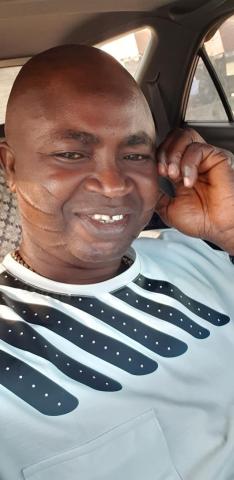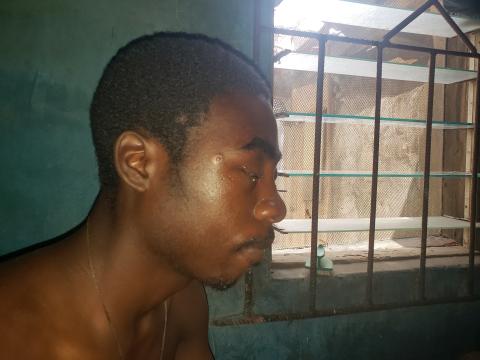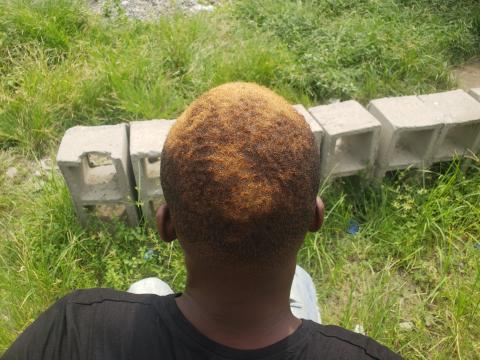
Lekki Toll Gate became the epicentre of #EndSARS protest-related violence but it was not the only place in Lagos State that was characterized by chaos and casualties. This is an investigation into similar events in Ajegunle.
Lekki Toll Gate became the epicentre of #EndSARS protest-related violence but it was not the only place in Lagos State that was characterized by chaos and casualties. This is an investigation into similar events in Ajegunle.
On Tuesday, October 20, 2020, Happiness Abraka, 19, woke up to a bright new day. But by dawn, he was in darkness.

Abraka is an apprentice in blacksmithing, a craft he started learning three years ago, upon graduating from secondary school. Given that he was average academically, he set his sights on excelling as a craftsman and he gave the venture all his dedication.
He planned to start his own blacksmith´s shop once he gained freedom from his master, but that ambition now seems unattainable, given his current handicapped state.
Abraka was one of the various victims of brutalities believed to have been committed by both state security apparati and sponsored political thugs during nationwide #EndSARS protests.

On that fateful Tuesday, Abraka left the single room apartment he shared with his mother and two other siblings in Ajegunle, one of Lagos State’s largest slums, to see what was happening on the protest ground a few streets away from his home .
His boss at the blacksmith's shop had given him a day off work, presenting him an opportunity to join thousands of Nigerian youth who had poured unto the streets to demand an end to police brutality, extortion and extrajudicial killing by officials of the now dissolved Special Anti-Robbery Squad (SARS).
It was Abraka’s first time joining the protest, which had gained global attention after it started about two weeks earlier.
“I decided to go and see what was happening,” Abraka says, but he did not leave the protest ground with his sight. Instead, he left with a metallic ball forcing a pathway through his temple.
¨I don't know what to do anymore,¨ he says despairingly.
Abraka recalled standing by a corner, away from the protesters but close enough to watch, as they chanted songs, danced, waved placards and the Nigerian flags.
Suddenly, there was a loud bang that clouded the atmosphere with Chloroacetophenone, commonly known as tear gas, then followed by sporadic shootings.
In that instance, Abraka’s vision went pitch black.
“I fell to the ground,” he remembers. ¨I then heard a voice telling me to move.¨
Abraka was guided into an uncompleted building. There, he recalled, he was given alcohol to drink.
¨[I realized] I could not see anymore,¨ he reveals.
A bullet had pierced his head from the side, ripping through both of his eyes.
A hospital report confirms he is now completely blind.
Another DJ saved the day
One of the heroes of the Lekki Toll Gate debacle is Onianuju Catherine Udeh, popularly known as DJ Switch. She streamed the attack at the scene and was one of the first people to accuse the Nigerian Army of extrajudicial killing of harmless civilians.
But while DJ Switch had the privilege of a smartphone and good internet access, DJ Olympics* had none of that. The only thing he had in common with DJ Switch was courage.
That voice Abraka heard after he got shot was DJ Olympics’. It was DJ Olympics who guided Abraka into an uncompleted building, away from stray bullets but still under a cloud of tear gas at the chaotic scene of the protests.
It was DJ Olympics who gave Abraka the alcohol in an attempt to save his life.

“I have heard that you don’t give water to someone with a gunshot wound,¨ DJ Olympics explains. ¨So I gave him dry gin. I made sure he finished 150ml of Chelsea.¨
DJ Olympics himself had narrowly escaped getting killed. A bullet had left its mark inches away from his ribcage.
“I was lucky,'' he says. ¨A lot of people died that day.¨
Peaceful Protest
Abraka was one of the first people hit by bullets when government-backed thugs, in collaboration with the Nigerian Police Force, attacked peaceful protesters in Ajegunle that Tuesday.
According to multiple accounts from eyewitnesses, residents, victims and families of victims, the violent thugs and men of the Nigerian Police Force were led by Kaka, known to be a vicious vigilante in the vicinity, and the right-hand man of Fatai Ayoola, the Chairman of Ajeromi Ifelodun Local government Area.
Multiple sources told this reporter that the Ajegunle protest, attended by Oritse Femi and Africa China, two well-known musicians in Nigeria, was ¨very peaceful¨ until violence erupted.
The attack on peaceful protesters in Ajegunle was eerily similar to what happened at the Lekki Toll Gate.
Lekki, one of the wealthiest areas in Lagos state, is about four hours away from Ajegunle, but while the incidents at the toll gate gained global attention, few people knew of the heinous crimes that happened in Ajegunle.
Media attention was focused on Lekki Toll Gate, and even months later Nigerians have continued to demand justice for those killed there, but few people in the mainstream have known that Ajegunle deserves as much justice.
Before the first shot was fired at the toll gate, tens of protesters had already died in Ajegunle. Abraka and many others had been maimed.
Civil Disobedience
The #EndSars protest started as peaceful agitation before it was hijacked by thugs whom many Nigerians believed were sponsored by politicians who wanted to tank the well-coordinated protest. This alleged state sponsored violence in many parts of the country, presented a golden opportunity for the government to step in.
The paid-to-disrupt agents started by attacking protesters, then police stations, and then government properties were burnt. State Governors announced curfews to restore peace and sanity.
Lagos State Governor Babajide Sanwo-Olu was one of such governors. He announced a curfew around 12 noon on October 20, sternly warning that “nobody, except essential service providers and first responders, should be found on the streets”.
Ajegunle protesters - like their colleagues at the infamous Lekki Toll Gate - were already on the protest ground when this announcement came and many could not and did not obey the state-wide curfew. They insisted they would remain on the street. This was an act of civil disobedience.
Civil disobedience in itself is an active tool of protest. Nigeria’s Electoral Act (as amended in 2015) gives the police a responsibility to provide security to protesters during political processions and rallies, explains Inibehe Effiong, a human rights lawyer.
“A society that is dictated by imperial or military decrees will oppose civil disobedience as a form of protest because it is seen as a challenge to the sovereign authority of the absolute ruler,” Effiong explains. “However, under a constitutional democracy, sovereignty belongs to and lies with the people.”
“The government is mandated to ensure that protesters are protected and given the space to ventilate their grievances. It is illegal and undemocratic to respond to civil disobedience and other forms of protests through the use of force or violence.”
Contrary to this legal opinion, overwhelming evidence shows that there was use of brutal force against peaceful protests who were only armed with placards and flags.
A few hours after the declaration of a curfew in Lagos, the Nigerian Army deployed soldiers from 81 Division to Lekki Toll Gate. In Ajegunle, an attack was launched against peaceful protesters by Kaka, his fellow political thugs and the police in the area.
There is no evidence to suggest that both the Lekki and Ajegunle attacks were either premeditated or coordinated, but they did happen almost simultaneously.
According to multiple eyewitness accounts and videos, at about 6:45pm, the armed 81 Division soldiers deployed to Lekki Toll Gate shot sporadically into the air, intimidating protesters who had been defiantly singing Nigeria's national anthem.
Soon afterwards, the soldiers aimed at the protestors and opened fire, injuring and killing an unknown number. Many families are yet to find their loved ones, who were last seen at the toll gate that day. There are claims, though they have since been denied by the Nigerian Army, that the soldiers took away the dead bodies of protesters they shot.
Over at Ajegunle, many protesters were also taking bullets to their heads and limbs while being dispersed. The only difference was that while soldiers were alleged to be behind the Lekki attack, the Ajegunle attack was carried out by a joint force of police and political thugs led by Kaka.
After a video of a Bus Rapid Transit (BRT) bus seemingly conveying thugs to Alausa (another protest ground in Lagos State) surfaced on social media, suspicions of state involvement in attacks against protestors heightened.
But Governor Sanwo-Olu denied that state security agents were complicit in the attacks, insisting the state would ¨never be involved in such activities”.
Residents in Ajegunle claim that Kaka, the kingpin who led the attack, is the Chief Security Officer (CSO) of Fatai Ayoola, the chairman of Ajeromi Ifelodun Local Government, the overseeing governing authority in Ajegunle. Ayoola is a member of the ruling party, All Progressives Congress (APC), same as the governor of Lagos State.
In an exclusive interview with this reporter, Ayoola denies that Kaka is his CSO, but he confirms knowing Kaka and being aware of his atrocities. He in fact defends him, blaming Kaka’s accusers of peddling rumours.
¨He [Kaka] is the one that is in charge of overseeing all the hotels of Ndokwa [a prominent hotelier in Lagos] in this community, and Ndokwa has a number of hotels. That is his job.”
Ayoola admits that Kaka has ties with the police. “He is one of the OPC’s strongmen that work in collaboration with the Nigerian Police Force to abate crime,” he says.
The chairman’s denial of Kaka as his CSO contradicts what Micheal Ojobaro, the youth leader in the community, knows to be true.
“Kaka is the Chief Security Officer to the council chairman,” Ojobaro reveals in a separate interview with this reporter. [He is ] the CSO to the party chairman and I coordinate the security of the local government. He is [also] a commander in OPC.”
A letter sent to the Lagos State Police Command through Sahara Reporters to verify the claim that Kaka works in collaboration with the police in Ajegunle received no response.
SARS and Suppression
DJ Olympics says he toned down his rockstar-like looks because he got tired of being wrongly profiled as a fraudster by SARS officials. SARS became notorious for profiling young Nigerians by their way of dressing, the brands of their cars, as well as the models of their laptops and phones.
During this reporter´s interview with the local disk jockey, he wore a pair of ripped jeans, a black t-shirt and a pair of slides. He had his hair cut low and tinted blond, a departure from his usual look of well-groomed dreadlocks, which he said he prefers.
“I am a DJ, but I cannot look the part because of SARS,” he bemoans. “I have been arrested multiple times because of my hair (dreadlocks). I would tell them I am a DJ but they would not let me go until I have given them money, all because I have dreadlocks. I had to cut it. It really pained me because I spent so much on the hair but I had to.”
The young DJ´s story is similar to those shared by millions of other Nigerian youth concerning SARS, with common themes of profiling, harassment, extortion, arbitrary arrests and sometimes extrajudicial killing - the factors that fueled the October protests.
SARS, established with noble intentions in 1992 and disbanded shortly after the protests, was for most of its years of existence seen as an obnoxious institution by the youth and a blot on Nigeria's security system.
In 2018, when an office was created for the SARS unit at Ajeromi Police Station in Ajegunle, some of the youth leaders thought it was the solution to gang violence in the area.
“There was violence, armed robbery, stealing and raping in broad day light,” says Ojobaro, remembering the social unrest that brought SARS into Ajegunle.
The creation of the unit was applauded. It would be the end to all the vices in the community, they thought.
But they were wrong, to a fatal degree.
The excitement that heralded the creation of the unit soon fizzled out as cases of human right abuses began to pile up, a bizarre opposite of what they had expected.
“SARS came in through our request,” Ojobaro recalls, “when they came, they were working; sanitizing the community, arresting the top criminals and cultists.
“Then, the former commander was transferred to Kano overnight, without his knowledge. When he was transferred, someone else took over and the unit lost track. They began to take civil cases, arresting Okada...”
According to Ojobaro’s account, the community wrote a petition against the conduct of the operatives to the police headquarters, after which the SARS unit was overhauled about five weeks before the start of the #EndSARS protest.
Community leaders felt Ajegunle had fought and won its own SARS battle, and so there was hesitation in encouraging young residents in the area to join the nationwide #EndSARS movement.
“We felt that in Ajegunle, we had already ended our own EndSARS by doing the right thing in changing what we didn´t want,” Ojobaro says. “We felt that other communities ought to be able to get close to the police force, check them, and correct their abnormalities - neither by violence nor by protest.”
After initially discouraging the youth in the community from participating in the protests, the community leaders had a change of mind as the protests became more intense and the voices became louder. It was no longer possible to keep the spirit of the protest at bay.
On October 10, 2020, the first #EndSARS protest happened in Ajegunle, with young men and women in the community coming out en masse.
“It was very peaceful,” Ojobaro says.
This is the first part in a series that documents atrocities committed against peaceful #EndSARS protesters, and how a high-ranking political thug terrorises a poor and defenseless community. In the next part, more of Kaka’s activities, as well as his real name, will be revealed.